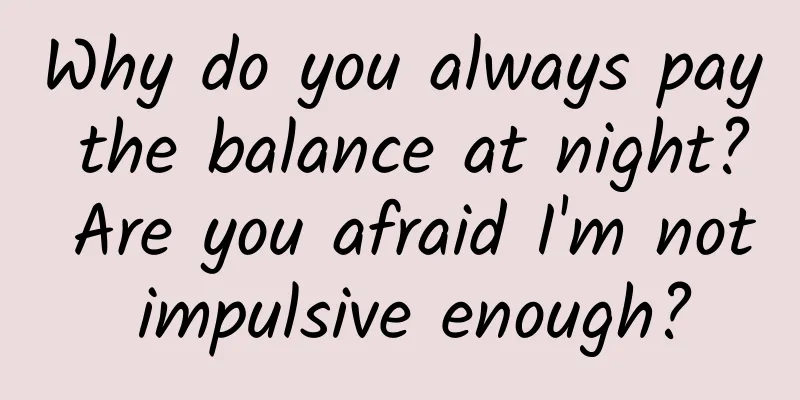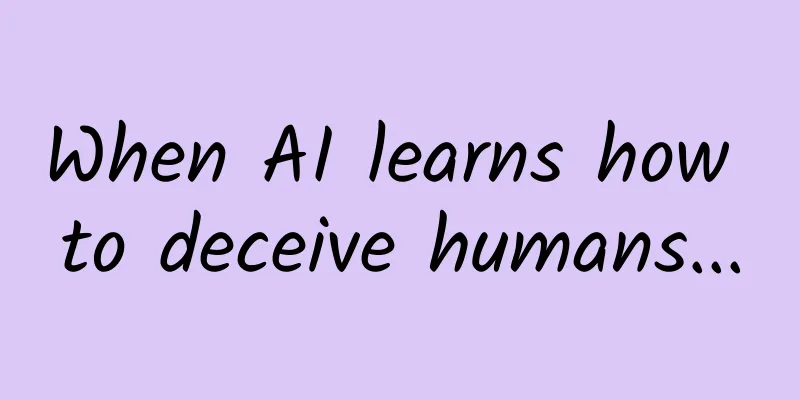Why do you always pay the balance at night? Are you afraid I'm not impulsive enough?

|
Review expert: Taozi National Psychological Counselor Friends, have you added a lot of "grass-planting" products to your shopping cart recently? With the arrival of the 618 promotion, major e-commerce and live broadcast platforms have once again made efforts, with various means such as full discounts, pre-sales, coupons, etc. emerging one after another, and late-night live shopping is the most classic marketing activity among them. Even if it’s not a shopping festival, on a quiet night, we always accidentally see some tempting advertisements or exciting live broadcasts of goods, and there is always a surprise of “Wow, I just need this!” So, after a night of “shopping”: Source: Zhihu @Family Doctor Online When we wake up the next day and see the long list of orders to be shipped and deduction records, we will regret it again: Why did I make impulse purchases again last night? Source: Zhihu @Family Doctor Online "I didn't want to do it, but it was my own hand, I couldn't bear to chop it off..." Every regret in the morning is actually a mistake made at night. Impulsive consumption in the middle of the night is ultimately caused by people's surging desire to buy late at night. So, what exactly is the desire to buy? How is it stimulated? What role does this special time point of late night play in it? Below, the editor will take you to find out! 1How is purchasing desire stimulated? Purchasing desire refers to consumers' motivation, desire and demand for purchasing goods or services. It is a necessary condition for converting consumers' potential purchasing power into actual purchasing power. Simply put, purchasing desire is people's strong desire to buy goods. The stimulation of purchasing desire is one of the important research areas in marketing and consumer psychology. Its influencing factors can be summarized into the following three aspects: 1. Emotional factors: Under the influence of certain specific emotions, people's desire to buy will be significantly stimulated. For example, when people watch live broadcasts, the anchor interacts with the audience in real time, and uses real-life demonstrations and extreme output to show the characteristics, functions, and usage effects of the products during the live broadcast, quickly grabbing the audience's attention, establishing the audience's sense of identity and intimacy, and touching on emotional needs such as pleasure and respect, thereby guiding the audience to have a desire to buy and promoting purchasing behavior. Source: Anchor interaction screen 2. Social factors: The emergence and popularization of Internet tools such as social media and shopping platforms have changed traditional consumer behavior. The emergence of new technologies such as personalized recommendations, intelligent customer service and online communication and the convenience of information dissemination have also greatly stimulated consumers' desire to buy. When you open the shopping app, the platform will use big data technology and machine learning algorithms to analyze the user's historical behavior, recommend products related to their interests, and match consumers' interests with audience positioning through advertising push and other methods, so that consumers have a sense of demand for products and strengthen their desire to buy. In addition, most anchors are very contagious. They not only introduce products in line with consumers' needs, but also consciously use names such as "baby" and "family" to shorten the distance between themselves and consumers, so that people watching the live broadcast feel valued and concerned, and have emotional resonance with the anchor. The daily atmosphere of the anchor bringing goods (scene interpretation) Source: "Anchor Classroom" short video 3. Promotional techniques: New contextual promotional techniques such as digital marketing, e-commerce platforms and smart sales promotion have also been proven to have obvious advantages in stimulating purchasing desire. Among these marketing strategies, digital discounts and referral techniques (such as "stacking cats" and "forwarding to share a 10 yuan red envelope") are important factors affecting purchasing desire. In certain time periods, such as 618 and Double 11, shopping platforms will launch promotional activities such as full discounts, limited-time discounts, lucky draws, and flash sales. These timely discounts make consumers feel that the product is valuable and necessary to snap up, increase consumers' confidence in making quick decisions, and strengthen their desire to buy. Targeted delivery and advertising tracking have also greatly improved marketing efficiency. Source: A shopping app Of course, purchasing decisions in different cultural backgrounds are influenced by factors such as language, customs, and values. On certain occasions, such as Christmas, Mother's Day, Valentine's Day, etc., the demand for buying gifts in Europe and other Western countries will also increase significantly. Source: veer 2Why is it easier to make impulse purchases late at night? A study in the Journal of Consumer Research showed that consumers are more likely to choose content that makes them happy, gives them instant gratification, and appeals to their intuitive impulses at night. Source: Screenshot of JCR website In addition, research from Duke University in the United States shows that people seek more variety at night than during the day, that is, they want to try different and new things. Therefore, those things that they hesitated to buy during the day will be decided to be ordered at night. Night is usually the most relaxing time for "workers". The fatigue caused by work can easily make people have a compensatory mentality. In addition, biological clocks, social isolation and pressure can also make people more likely to make impulse purchases at night. 1. Physiological factors: The biological clock can affect people's various physiological processes, such as sleep, hormone release, etc. Studies have shown that cortisol levels rise at night, and most people's biological clocks tend to cause hypothermia and metabolic slowing at night, which may also lead to increased mood swings. In addition, activity in the brain's prefrontal cortex can reduce people's control and self-control, making them more prone to impulsive behavior. Source: "Self-Control" 2. Mental stress: During a day’s work and life, people may encounter a lot of pressure and difficulties. At night, physical and mental fatigue reaches its peak. These depressed emotions are more likely to cause people to have emotional fluctuations. Long-term and high-intensity mental fatigue will lead to a decrease in the individual’s control and inhibition, increasing the possibility of them making impulsive decisions. 3. Social support: Studies have shown that quality of life is affected by the level of support, and reduced or absent social support can increase emotional problems. At night, people have more time to be alone, and this social isolation and loneliness may make individuals more susceptible to negative emotions, so the music apps they listen to at night often become "Internet Depression", which brings mood swings that are rarely seen during the day. In addition, fewer social opportunities at night may make individuals rely on non-face-to-face communication modes such as social media, making them more easily influenced by the behavior and emotions of others, thereby changing their decisions and behaviors and making impulsive behaviors and consumption. Source: pexels In short, although there will be greater emotional fluctuations late at night, causing people to quickly place orders at the urging of "3, 2, 1, go to the link", you must not place orders impulsively because of the atmosphere of scarcity, low prices, and loss if you don't buy created by the anchor, or out of blind trust in the anchor personally. You can give yourself a week to think about it, and be wary of "big sales" and "full discounts" ; you can also set up AB cards for yourself, put fixed expenses in card A, and the rest in card B, and limit online shopping to the money in card A. In addition, you must also choose the right time to shop, and try not to shop when you are unhappy or hungry, which will make people have a higher evaluation of food, clothes and other items, and want to own them more. |
<<: Zhejiang University team creates new substances, and the results are published in Nature
>>: Popular Science Illustrations | One Picture Reveals the Key Technologies Behind Express Delivery
Recommend
Baise Game Mini Program Customization Price Inquiry, How much does it cost to customize the Baise Game Mini Program?
There are two types of customization of Baise Gam...
Do you take oseltamivir as a "magic flu drug" when you have a fever? You should understand this before taking it →
Speaking of Oseltamivir I believe everyone is fam...
Are dual cameras useless? 70% of respondents said they don’t care whether their phones have dual cameras
For most consumers, whether the camera function i...
Why are my hands still oily when I eat crayfish even though I'm wearing gloves? I finally figured out what's going on
Expert of this article: Chu Yuhao, PhD of Beijing...
How does Perfect Diary, a company worth hundreds of billions of yuan, manage private domain traffic?
A word of caution: The launch of Perfect Diary ha...
User operations: 4 common user stratifications
Today we will move on to the second section of co...
Let me give you an example of the pitfalls I encountered when making event products (data review)
Let’s review the activity process first: 1. Total...
The secret to sustained brand growth and three major marketing strategies!
Changes in consumer main forces and alterations i...
Bidding promotion: 6 secrets to high conversion!
A few days ago, someone chatted with me and said:...
Brand Marketing Promotion | Where will the “viral” spread of vulgar marketing lead to?
Introduction: I don’t know when it started, but t...
How to plan a successful and beautiful event?
As an operator, event promotion (event operation)...
Master Lu Power Consumption Test Report Issue 2: vivo S18 wins the championship, Blue Ocean Battery has something special
As the year draws to a close, those friends who h...
How much can AI help you fill in your college entrance examination application form? Just a supplement!
□ Zhang Gailun, a reporter from Science Times The...
Faced with constant pessimism, why have new car manufacturers such as NIO ushered in historic opportunities?
NIO successfully went public in the United States...
Momo Live User System: How to get users to pay?
The author analyzed the user growth path of Momo ...









